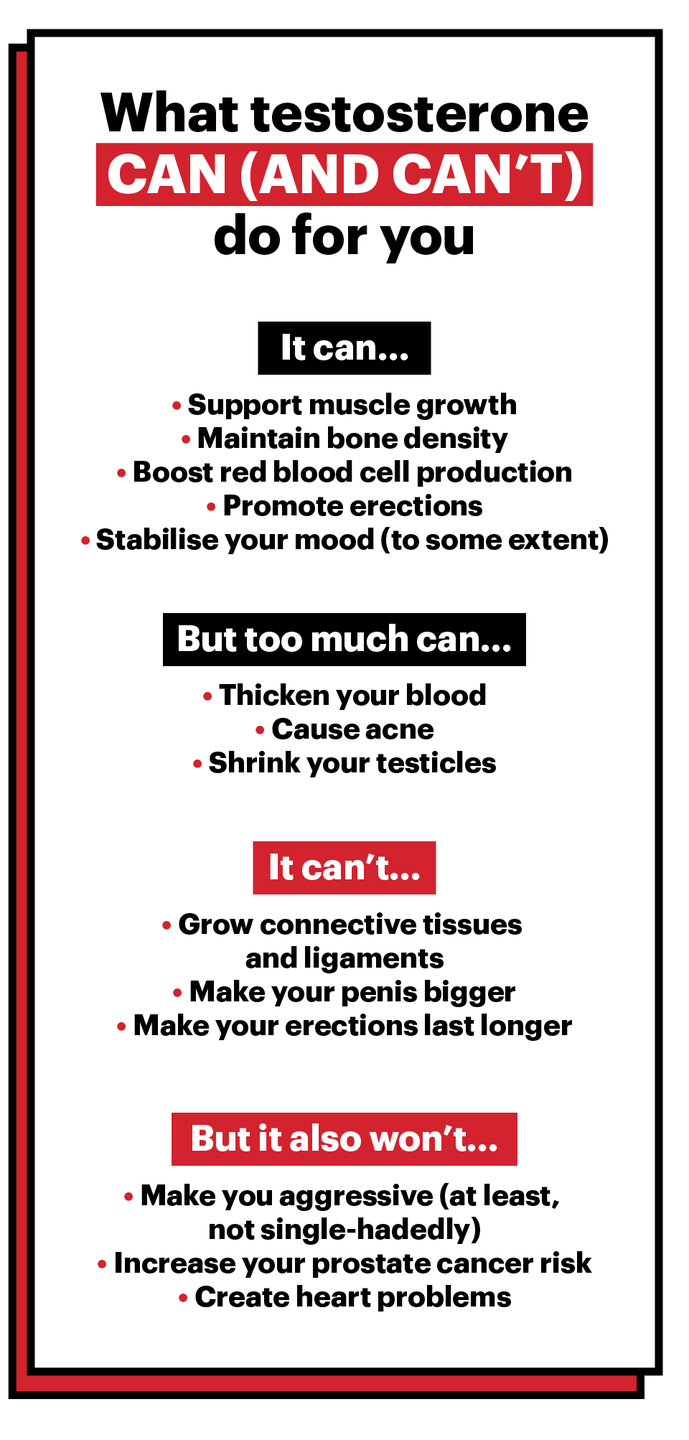Is Testosterone a True Measure of Manliness? MH Investigates the Myths and Misconceptions of the Male Hormone

On 1 June 1889, a French-Mauritian physiologist and proto-life-hacker named Charles-Édouard Brown-Séquard gave a presentation at the Société de Biologie in Paris. He reported that he had been experimenting with something he called a “liquide testiculaire”. He made this by mixing water with blood from the testicular veins, semen and a “juice extracted from a testicle, crushed immediately after it had been taken from a dog or a guinea pig”. Then he injected himself with it.
Monsieur Brown-Séquard was happy to report that, at 72 years old, he felt like a new man. He estimated that he could project his urine 25% further than he could before. He also found that his brain was rejuvenated; he now felt as sharp as he had when he was young. He warned that the effects were short-lived – a major clue that he was experiencing a placebo effect – but no matter. By the end of 1889, it was estimated that as many as 12,000 scientists were shooting up testicle smoothies. Chemists made a fortune from selling the “elixir of life”.

It was, of course, bollocks. But to be fair to Brown-Séquard, his hunch that there might be some sort of “substance or substances” produced in our glands, running through our bloodstream, influencing everything from our penises to our brains, wasn’t so wide of the mark. This is what hormones do. Hormones are molecules that flow through our endocrine systems and attach themselves to receptors in our cells, delivering messages that influence sex and fertility, energy levels, the strength of our muscles, mood, metabolism, memory, sleep and everything in between.
The first hormone to be discovered was secretin, in 1902. Over the next few decades, oestrogens, progestogens and androgens – the hormones that determine sexual development – were identified, too. By 1935, the American biologist Fred Koch had performed enough experiments with bulls’ testes purloined from Chicago abattoirs to establish the existence of the androgen testosterone – the big T – which soon became known as the “male hormone”. What followed was something of a testicle rush. When cockerels were injected with testosterone, their droopy cockscombs became perkier. There is a cocktail called a Monkey Gland (gin, orange juice, grenadine, absinthe), named in honour of Serge Voronoff, a Russian surgeon who advocated grafting monkey testicles onto humans to increase energy and longevity. In short, it appeared that the essence of life had been located – and it was male.
Gender Trouble
Fast-forward a century and, despite the advances in science, it seems that this is still something that many are willing to believe. In the US and increasingly over here, testosterone replacement therapy (TRT) is touted as a cure for the so-called “male menopause”, a miraculous way to restore youth and alpha-maleness. Meanwhile, “low T” has become an insult aimed at men perceived to be lacking in energy, resolve and manliness – often used synonymously with terms such as “soy boy” and “snowflake”.

Across the world, a wave of macho leaders – Vladimir Putin of Russia, Viktor Orbán of Hungary, Jair Bolsonaro of Brazil, Narendra Modi of India, Recep Erdoğan of Turkey, Rodrigo Duterte of the Philippines – has achieved success with various strains of testosterone politics, often promising to restore some assumed natural order between men and women. Donald Trump went so far as to have his T-levels read out on live TV during the 2016 US election campaign. “Your testosterone is 441, which is actually… good,” said Dr Mehmet Oz. Cue a round of applause from the studio audience. “Donald Trump: Finally Someone with Balls” read T-shirts at his rallies. During the same campaign, one Florida doctor offered T tests for any man considering voting for Hillary Clinton.
Again, all of this is, to put it bluntly, balls. Testosterone doesn’t predict how liberal you are, let alone your sexual success, or whether you’ll beat your wife, live forever or be a good president. But there is something about testosterone that plays into these myths of maleness – myths that circulated even before testosterone was discovered.
Some facts, then. Testosterone is the prototypical “masculine” hormone, as Professor Pierre-Marc Bouloux of the Society of Endocrinologists notes, but that doesn’t mean it’s the essence of masculinity. All foetuses begin life as female phenotypes, but at six weeks or so, male foetuses experience a surge of testosterone. “It is very important in helping to masculinise the baby in the womb – it gives him a penis – and when you reach puberty, it enables the deepening of the voice, increases the size of the penis, and so on,” explains Bouloux.
After puberty, our testosterone levels remain more or less constant until our mid-forties, when there’s a slight drop. “A small proportion of men, perhaps 10-15%, will have a significant reduction in testosterone. But whether that’s enough to cause symptoms is another matter,” says Bouloux. To frame this as a “male menopause” that is equivalent to the hormonal changes experienced by women of a similar age, he notes, would be misleading.
Testosterone is often contrasted with oestrogen, supposedly the “feminine” hormone. But men have oestrogen and women have testosterone, just in different concentrations. Testosterone also acts differently on different men, and no one has ever established a credible link between high T levels and supposedly masculine traits such as assertiveness, bravery, or risk-taking. Simply put, more testosterone does not necessarily make a man more of any of these things. It does promote muscle growth – but there’s more to a man than his biceps.
We all get tired - but do you still feel drained of energy and enthusiasm even after a restful weekend, or a solid night's sleep?
A dad bod is rarely a symptom of a medical issue. But it could be if you notice fat around your middle or chest when you've never been prone to it.
Extremely low T levels will keep you limp. But explore psychological factors, too. If you don't always want sex after a tough week, that's normal.
The Male Animal
Our relationship with testosterone is complicated. And it can easily become controversial: consider the bitter arguments surrounding testosterone levels in female and transgender athletes.

There are three main androgens –testosterone, dihydrotestosterone (DHT) and androstenedione. These are all part of an intricate system involving enzymes, receptors, proteins and other hormones. For example, Professor Bouloux notes, men who lack the enzyme to convert DHT into oestrogen tend to experience a loss of libido. “This suggests that libido in men may not be testosterone dependent, so much as oestrogen dependent,” he says. “You need oestrogen in order to get the full flavour of testosterone, if you will.”
Moreover, Bouloux explains that it’s a misconception that our testosterone levels dictate our behaviour. Testosterone doesn’t “make” men sexually aggressive. If you’re predisposed to be sexually aggressive, a surge of testosterone might nudge you to be more so. But this effect varies in individuals. “We do know that some men are unduly sensitive to their own testosterone and others are less sensitive,” says Bouloux. “Within the global distribution of men, there will be some who only require a small amount of testosterone to have all the effects, and others who have high levels of testosterone but don’t have the aggression, or the high muscle bulk.”
This isn’t the message you would take from the popular image of the hormone, argue Rebecca Jordan-Young and Katrina Karkazis in Testosterone: An Unauthorized Biography. “T is at once a specific molecule and a mercurial cultural figure – a familiar villain and attractive bad boy that supplies a ready explanation for innumerable social phenomena,” they write. They cite a 2002 episode of the radio show This American Life, in which a transgender man from New York describes how he started taking testosterone while transitioning from a female body while at university. “I felt like a monster a lot of the time. And it made me understand men,” he reported. He described an “incredible increase in libido”, to the point where he could no longer uphold a conversation with a woman. Not only that: he developed a new interest in physics and problems with expressing his emotions. So far, so macho.
As Jordan-Young and Karkazis point out, ascribing these changes exclusively to testosterone lends a scientific veneer to stereotypes that are cultural, not biological: men are lecherous, boys don’t cry, women can’t do physics. But this account also positions testosterone as a mysterious force, running through the veins of men, possessing them, making them do things against their will. “T is a wilful character,” they write. “When T whispers instructions in the ears of hapless men, it’s clear that T has a plan, and that plan is to maintain the natural order of things.” It’s like a horror story – or, depending on your point of view, a fairy tale.
The Ages of Man
A new generation of monkey gland salesmen has latched onto these myths. Forever Alpha, a website promoting T-raising regimes, promises to help you “shed fat, increase testosterone levels and skyrocket your sex appeal”. The associated Twitter account warns that “low T” is a sure route to depression, anxiety and stress. Some of the advice is sound and undoubtedly preferable to injecting yourself with anabolic steroids: sleep more, don’t get fat, cut down on alcohol, eat more fish. However, some of it is quite strange: “Spend more time with attractive females! It’s a scientific fact – testosterone goes up by 13% even by flirting with attractive women.” Lucky women.
Such advice exists since hormones are understood to respond to not only biological but social cues – even political ones. Hence the widespread notion that testosterone levels are falling due to some sort of “feminisation” of society. Exhibit A is an oft-cited 2007 study from the Journal of Clinical Endocrinology and Metabolism that shows the average testosterone levels in males falling by around 1% each year from 1987 to 2004.
Many theories have been put forward as to why this might be. It could be related to rising rates of obesity. It could be because we spend so much time sitting down. It could be linked to the decline in sperm counts observed over the same period. Or it could have something to do with men playing a more active role in childcare. New dads experience a notable decrease in testosterone production. So, are we saying that it’s bad for men to care for children?
It could also be that the data is being misinterpreted. Medical professionals seem far less concerned about the dip than conservative commentators and alt-right forums. “It’s not a public health issue that I’m aware of,” says Dr Allan Pacey, a professor of andrology at the University of Sheffield. “What makes it high up our agenda is the perception that men should do something about their declining testosterone levels when they’re older. And this is fuelled by social media and private medicine. It’s not being fueled by the science.”
Pacey stresses that testosterone levels are not constant throughout life. You need spikes when you’re going through transition phases such as puberty, but you don’t need puberty levels of testosterone to sustain masculinity.
“So, are we saying that a 45-year-old is less of a man than a 25-year-old, just because he’s got 10% less testosterone? That’s when it begins to get dangerous.”
It’s true that some men stop producing sufficient testosterone as they age, and this is a serious problem for them. The numbers are relatively small – about 4% of men in the 50-80 age cohort – but when Bouloux lists the symptoms, you can see why so many become convinced that they are low T. “You have a decline in libido,” he says. “You might become impotent, or have a softening of erections. You may accumulate some tummy fat. You make fewer red blood cells, so you become a bit anaemic, and you may feel more tired. You may well experience irritability, anxiety, frustration, a loss of identity.”
The Low-Down
Drug companies love symptoms that are so vague and widespread. However, there are myriad other reasons why you might experience a loss of libido. Perhaps you’re in an unhappy relationship. And perhaps you’re experiencing anxiety, frustration and a loss of identity because you’ve lost your job, or work in an unstable industry. Your irritability might simply be the result of spending too much time on social media. Or perhaps you’re drinking too much. “Many people who try to sell the drugs suggest that somehow this loss of vitality is directly related to testosterone. That couldn’t be more untrue,” says Bouloux. “Men often come to see me imagining they’re low in testosterone. Then I test them and discover they’re in the normal range.”
It should be further stressed that the evidence for the efficacy of testosterone used as a treatment is not good. A systematic review of 156 eligible randomised controlled trials from 2016 found testosterone to be “ineffective” when it came to treating erectile dysfunction and “inconsistent” when it came to libido. Most studies found “no beneficial effect” on mood, personality or cognition. Testosterone did consistently increase muscle strength, but it didn’t have any overall benefits on physical function. Should you want to build muscle fast, injecting anabolic steroids will do that, as well as a whole host of other nasty, dangerous, undesirable things. And anyway, you also risk infertility, thereby decreasing your evolutionary fitness.
“For most men, declining testosterone is not a health issue,” says Dr Pacey. “But it’s made into a health issue when they are told there is a replacement and that private doctors are willing to prescribe it to them. Men get old. We should deal with it in a graceful way.” Ageing well requires consistent, healthy actions. There is no shot in the arm.
You Might Also Like


